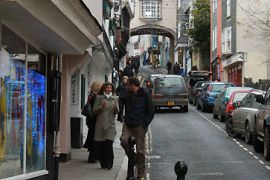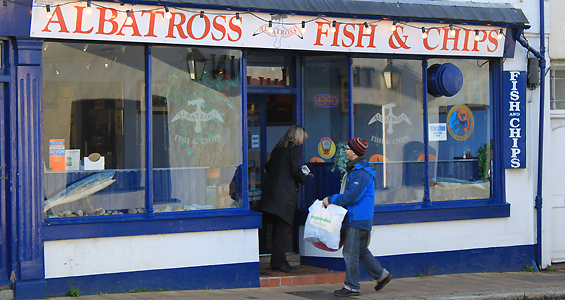English town’s climate lessons
A town in Devon, England, braces itself for the potential impact of climate change.

 |
| In Totnes a rickshaw run on bio-fuel made from old fish and chip oil is used as a taxi |
As the discussions at the Copenhagen climate summit continue, life will go on as normal in one small English town, but delegates may be wise to spare a thought for Totnes.
It is an example of how one community is thinking ahead and altering its behavior in preparation for the changes that climate change might bring.
| In video |
|
|
Totnes, in the county of Devon, in southern England, is home to about 8,000 people. It has long had a reputation as a town that embraces what some in the UK would call a ‘bohemian’ lifestyle.
Keep reading
list of 4 itemsTurtles swimming to extinction in Malaysia as male hatchlings feel heat
Could shipping containers be the answer to Ghana’s housing crisis?
Thousands protest against over-tourism in Spain’s Canary Islands
However, Totnes offers much more than funky shops and art galleries. There is a cross section of people bound by a commitment to help preserve the planet for future generations.
The Transition movement in Totnes was co-founded by Rob Hopkins. He is an environmentalist whose passion for creating a lifestyle which has more positive impact on his surroundings, has enthused many people in Totnes and beyond.
Practical preparation
The idea of the transition project is to prepare for, and make the community more resilient against, the potential impact of climate change, and a time when natural resources, such as oil become less readily available and so more expensive.
Instead of being downbeat, Rob remains positive. He says that instead of sending out miserable leaflets to scare people about the impact of climate change and peak oil, his campaign’s energy is focused on being practical.
The aim is to create a vision of a lower carbon future which will take us to a better place from where we are today, he says.
Wherever you go in Totnes, there’s evidence of the Transition project. Within an hour of arriving in the town, Al Jazeera cameraman Ben Mitchell and I found ourselves being driven around in a rickshaw, a three wheeled vehicle more likely to be seen in Thailand than Totnes.
The rickshaw is being used as a new taxi and run on bio-fuel made from old fish and chip oil. It was donated from a local fast food restaurant. Totnes lies in quite a hilly area, so the idea of getting to the top of the town by taxi is proving to be a hit.
Sustainable food source
In the hills surrounding the town nut and fruit trees are being planted on council land. These will take years to grow but project volunteers want to create a sustainable food source for future generations as well as their own.
One where people don’t have to rely on produce which might have travelled thousands of miles via air, sea and road to reach the supermarket shelves.
The transition project is widely supported. One local woman told us she had joined gardening co-operative and now grew some of her own food.
“In the past few years a huge amount has changed and people’s consciousness about what’s happening globally has changed through Transition town Totnes.”
We also met a man who had built his own eco-house, partly out of straw. It wasn’t difficult to find designer Jim Carfrae, his stylish home has become a local eco landmark.
Inspiring model
From the outside, you would never guess that part of the walls have been created from bales of straw. “I always wanted to build my own home, but one made out of local organic materials as it uses a lot less energy. And building an eco-home doesn’t mean living a more difficult lifestyle,” Jim said.
Totnes has already inspired other cities and towns around the world to take matters into their own hands, to try to reduce their carbon footprint.
In the grand scheme of things the efforts may seem small in comparison with the potential problem.
But, with the UK government estimating that more than 40 per cent of CO2 emissions come from the actions we make as individuals, such as car travel and heating our homes, it would be fair to say that projects like the one in Totnes do have the power to make a difference.
